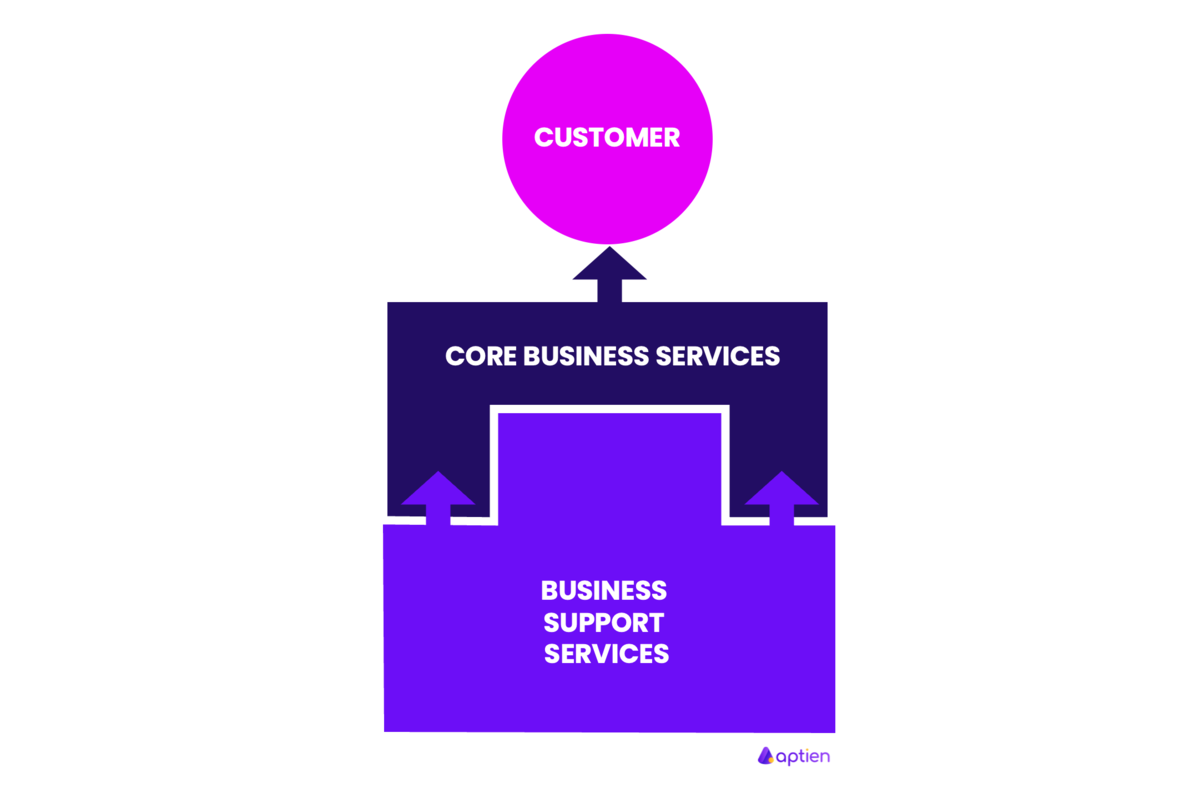Business support services are the internal processes and activities that keep a company running smoothly. They don’t directly sell products or services, but they enable core business teams to do their work efficiently and deliver value to customers.
In short, these services support production, service delivery, and everyday management. They are part of the company’s support processes and help ensure stability, efficiency, and growth.
Which Business Support Services are most common in small and medium businesses?
- Human Resources (HR): – Hiring and onboarding, payroll, training, performance management, and employee relations.
- IT Services – Network and device support, helpdesk, cybersecurity, software and systems maintenance.
- Finance & Accounting – Invoicing, bookkeeping, payroll processing, budgeting, and financial reporting.
- Facilities Management – Building upkeep, cleaning, utilities, workplace safety, and security.
- Office Administration – Reception, supplies, scheduling, and document handling.
- Legal Services – Contract review, legal advice, compliance support, and managing legal risk.
- GRC (Governance, Risk & Compliance) – Policies, risk assessments, audits, and regulatory compliance.
These support services let businesses operate efficiently, lower risks, and focus on their main activities that create value for customers.
Common Business Support Services in Small and Medium Businesses
Business support services help small and medium-sized businesses run smoothly by handling routine administrative, financial, legal, technical, and operational tasks. These can be done in-house or outsourced to specialists to save time, cut costs, and focus on growth.
1. Financial & Administrative Services
- Payroll processing – Calculating wages, taxes, deductions, and issuing paychecks.
- Tax services – Preparing returns, filing, and ensuring tax compliance.
- Bookkeeping – Recording income and expenses, reconciling accounts, and producing basic financial reports.
- Accounting & financial planning – Monthly/quarterly accounts, budgeting, cash-flow forecasting, and financial advice.
- Insurance – Business liability, property, and employee benefit plans.
2. Legal & Compliance Services
- Legal support – Setting up entities, drafting contracts, employment law, and handling disputes.
- Compliance & regulatory advice – Industry rules, licensing, and ongoing compliance checks.
- Translation & localisation – Translating contracts, policies, and customer materials for different languages or markets.
3. IT & Technical Support Services
- Software & app development – Custom tools, websites, and integrations to support your business processes.
- IT support & cybersecurity – Helpdesk, network support, data protection, and security monitoring.
- Equipment maintenance & repair – Servicing, calibration, and upkeep of business equipment.
4. Marketing & Business Growth Services
- Marketing & advertising – Branding, social media, email marketing, and online ads to attract customers.
- Business consulting – Strategy, process improvement, sales growth, and industry-specific advice.
- Events & promotions – Planning trade shows, product launches, and customer events.
5. Facilities & Operational Services
- Property & facilities management – Office or site maintenance, cleaning, and lease support.
- Utilities & telecoms – Connecting and managing electricity, water, internet, and phone services.
- Waste & recycling services – Regular waste collection, recycling, and environmental compliance.
- Security services – On-site security, access control, and physical security systems.
- Transport & delivery – Shipping, logistics, and local/last-mile delivery services.
- Parking management – On-site parking, permits, and valet services.
6. Employee Support & Workplace Services
- Training & development – Onboarding, skills training, and leadership programs for staff.
- Health & wellbeing – Employee assistance programs, workplace wellness initiatives, and occupational health services.
- Employee convenience services – Corporate travel booking, concierge services, and other staff support.
Outsourced vs. In-House Business Support Services
Small and mid-sized businesses often outsource non-core support tasks to lower costs, get expert help, and free up internal staff. At the same time, they usually keep functions that require close control, company knowledge, or strategic oversight in-house.
Commonly Outsourced Business Support Services:
- Payroll & Accounting – Outsource payroll processing, tax filings, and bookkeeping to providers like ADP, Paychex, or bookkeeping firms to ensure accuracy and compliance.
- Legal Services – Use outside law firms or contract attorneys for contracts, compliance, and employment law advice.
- IT & Cybersecurity – Hire Managed Service Providers (MSPs) or cloud specialists for network support, backups, and security monitoring.
- Marketing & PR – Contract agencies or freelancers for digital marketing, SEO, social media, content, and public relations.
- Recruiting & HR Admin – Use staffing agencies, recruiters, or PEOs for candidate sourcing, background checks, payroll administration, and benefits management.
- Facilities & Maintenance – Outsource cleaning, security, building maintenance, and property management to vendors.
- Translation & Localization – Hire language vendors or freelancers for documents, websites, and international customer support.
Business Support Services Typically Managed In-House:
- Employee Relations & HR Management – Internal HR handles employee engagement, performance management, policies, and culture.
- Office & Administrative Management – Day-to-day office tasks, scheduling, reception, and internal communications are usually kept inside the company.
- Project Management – Core projects that require cross-team coordination and company context are typically led by internal project managers.
- Strategic Planning & Leadership – Business strategy, budgeting, leadership decisions, and long-term planning remain internal responsibilities.
By outsourcing routine or specialized services and keeping strategic, people-focused functions in-house, SMBs can save money, access expertise, and stay flexible while protecting what makes their business unique.
How to manage support services
To manage support services you need to keep information about them. It also depends on whether you provide them yourself (internal services) or whether you buy them from providers. In both cases, however, for an internal customer, the actual provider, i.e. the one who guarantees the required service level (SLA), is an organizational unit or a specific responsible person within the organization. Not a specific employee, as a customer of an internal service will communicate directly with an external supplier.
- Keeping an overview, a catalog of services with the definition of their level (SLA)
- Managing requests from users
- Reporting incidents and problems around services
- Managing relationships with service providers
- Continuous service improvement and change management
